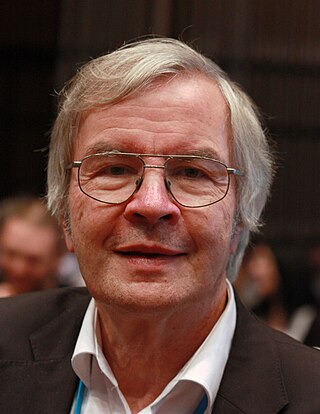
The Ludwig Maximilian University of Munich is a public research university in Munich, Bavaria, Germany. Originally established as the University of Ingolstadt in 1472 by Duke Ludwig IX of Bavaria-Landshut, it is Germany's sixth-oldest university in continuous operation.

Bert Sakmann is a German cell physiologist. He shared the Nobel Prize in Physiology or Medicine with Erwin Neher in 1991 for their work on "the function of single ion channels in cells," and the invention of the patch clamp. Bert Sakmann was Professor at Heidelberg University and is an Emeritus Scientific Member of the Max Planck Institute for Medical Research in Heidelberg, Germany. Since 2008 he leads an emeritus research group at the Max Planck Institute of Neurobiology.

Hartmut Michel is a German biochemist, who received the 1988 Nobel Prize in Chemistry for determination of the first crystal structure of an integral membrane protein, a membrane-bound complex of proteins and co-factors that is essential to photosynthesis.

Dieter Lüst is a German physicist, full professor for mathematical physics at the Ludwig Maximilian University of Munich since 2004 and a director of the Max Planck Institute for Physics in Munich. His research focusses on string theory. In 2000, he received the Gottfried Wilhelm Leibniz Prize of the Deutsche Forschungsgemeinschaft, which is the highest honour awarded in German research.
Dieter Fenske is a German inorganic chemist.

Theodor Wolfgang Hänsch is a German physicist. He received one-third of the 2005 Nobel Prize in Physics for "contributions to the development of laser-based precision spectroscopy, including the optical frequency comb technique", sharing the prize with John L. Hall and Roy J. Glauber.

The Gottfried Wilhelm Leibniz Prize, or Leibniz Prize, is awarded by the German Research Foundation to "exceptional scientists and academics for their outstanding achievements in the field of research". Since 1986, up to ten prizes have been awarded annually to individuals or research groups working at a research institution in Germany or at a German research institution abroad. It is considered the most important research award in Germany.

Thomas Carell is a German biochemist.

Matthias Mann is a German physicist and biochemist. He is doing research in the area of mass spectrometry and proteomics.
Peter Becker is a German molecular biologist. He studied biology at the Ruprecht Karl University of Heidelberg until 1984 and finished his Ph.D at the German Cancer Research Center and the Ruprecht Karl University of Heidelberg in 1987. After being employed at the European Molecular Biology Laboratory (EMBL) from 1991 until 1999 he became head of the Adolf Butenandt Institute for molecular biology at the Ludwig Maximilian University of Munich. In 2000 he was elected as a member of EMBO.

Günter Matthias Ziegler is a German mathematician who has been serving as president of the Free University of Berlin since 2018. Ziegler is known for his research in discrete mathematics and geometry, and particularly on the combinatorics of polytopes.
Stefanie Dimmeler is a German biologist specializing in the pathophysiological processes underlying cardiovascular diseases. Her awards and honours include the Gottfried Wilhelm Leibniz Prize of the German Research Foundation for her work on the programmed cell death of endothelial cells. Since 2008 she has led the Institute for Cardiovascular Regeneration at the University of Frankfurt. Her current work is focusing to develop cellular and pharmacological strategies to improve cardiovascular repair and regeneration. Her work aims to establish non-coding RNAs as novel therapeutic targets.

Gunther Hartmann is a German immunologist and clinical pharmacologist. Since 2007 he has been the Director of the Institute of Clinical Chemistry and Clinical Pharmacology at the University Hospital of the University of Bonn.
Ilme Schlichting is a German biophysicist.

Petra Schwille is a German professor and a researcher in the area of biophysics. Since 2011, she has been a director of the Department of Cellular and Molecular Biophysics at the Max Planck Institute for Biochemistry in Martinsried, Germany. She is known for her ground-laying work in the field of fluorescence cross-correlation spectroscopy, and numerous contributions on model membranes. Her current research focuses around bottom-up approaches to building an artificial cell within a broader area of synthetic biology. In 2010, Schwille received the Gottfried Wilhelm Leibniz Prize.
Michèle Tertilt is a German professor of economics at the University of Mannheim. Before, Tertilt was an assistant professor at Stanford University. She also spent a year at the University of Pennsylvania and one year as a research fellow at the Hoover Institution. She is currently a director of the Review of Economic Studies and associate editor of the Journal of Development Economics.
Joachim Küpper is a professor of romance studies and comparative literature at the Freie Universität Berlin. Küpper has published on authors from various periods, including Homer, Dante, Petrarch, Shakespeare, Francisco de Quevedo, Pedro Calderón de la Barca, Lope de Vega, Alessandro Manzoni, Balzac, Flaubert, Theodor Fontane, and Alain Robbe-Grillet. In addition, he works on problems of literary theory and intellectual history. He is the author of eight monographs and approximately 100 articles, as well as the editor of numerous volumes and scholarly journals.
Jürgen Rödel is a German materials scientist and professor of non-metallic inorganic materials at the Technische Universität Darmstadt.

Rupert Huber is a German physicist and university professor. Huber is known for his research in terahertz technology and semiconductor physics.

Wolfgang Anton Herrmann is a German chemist and academic administrator. From 1995 to 2019, he was President of the Technical University of Munich.














